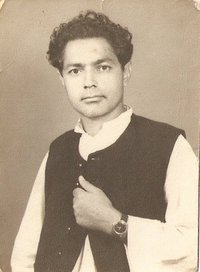This article needs additional citations for verification .(September 2012) |
Mohammad Shakeel | |
|---|---|
 | |
| Member of the Uttar Pradesh Legislative Assembly for Lucknow West | |
| In office 1974–1979 | |
| Preceded by | Syed Ali Zaheer |
| Succeeded by | Zafar Ali Naqvi |
| Personal details | |
| Born | 1927 |
| Died | 24 December 2007 (aged 79–80) [1] Lucknow,Uttar Pradesh,India |
| Resting place | Lucknow |
| Political party | Indian National Congress |
| Other political affiliations | Revolutionary Communist Party of India,Praja Socialist Party |
| Spouse | Begum Akhtar Jehan |
| Relations | son of Hakim Abdul Aziz |
| Children | 3 |
| Residence(s) | Akbari Gate,Lucknow |
| Occupation | Trade union activist |
| Profession | Labour lawyer |
| Committees | Executive Committee,Lucknow Municipal Corporation |
M. Shakeel (full name:Mohammad Shakeel,alt:M Shakil) was an Indian freedom fighter,politician,Urdu novelist,trade union activist and labour lawyer from the city of Lucknow,India. [2] [3] Born in the famous Azizi family of physicians,he was the grandson of Hakim Abdul Aziz. [4]
